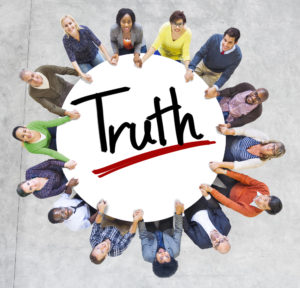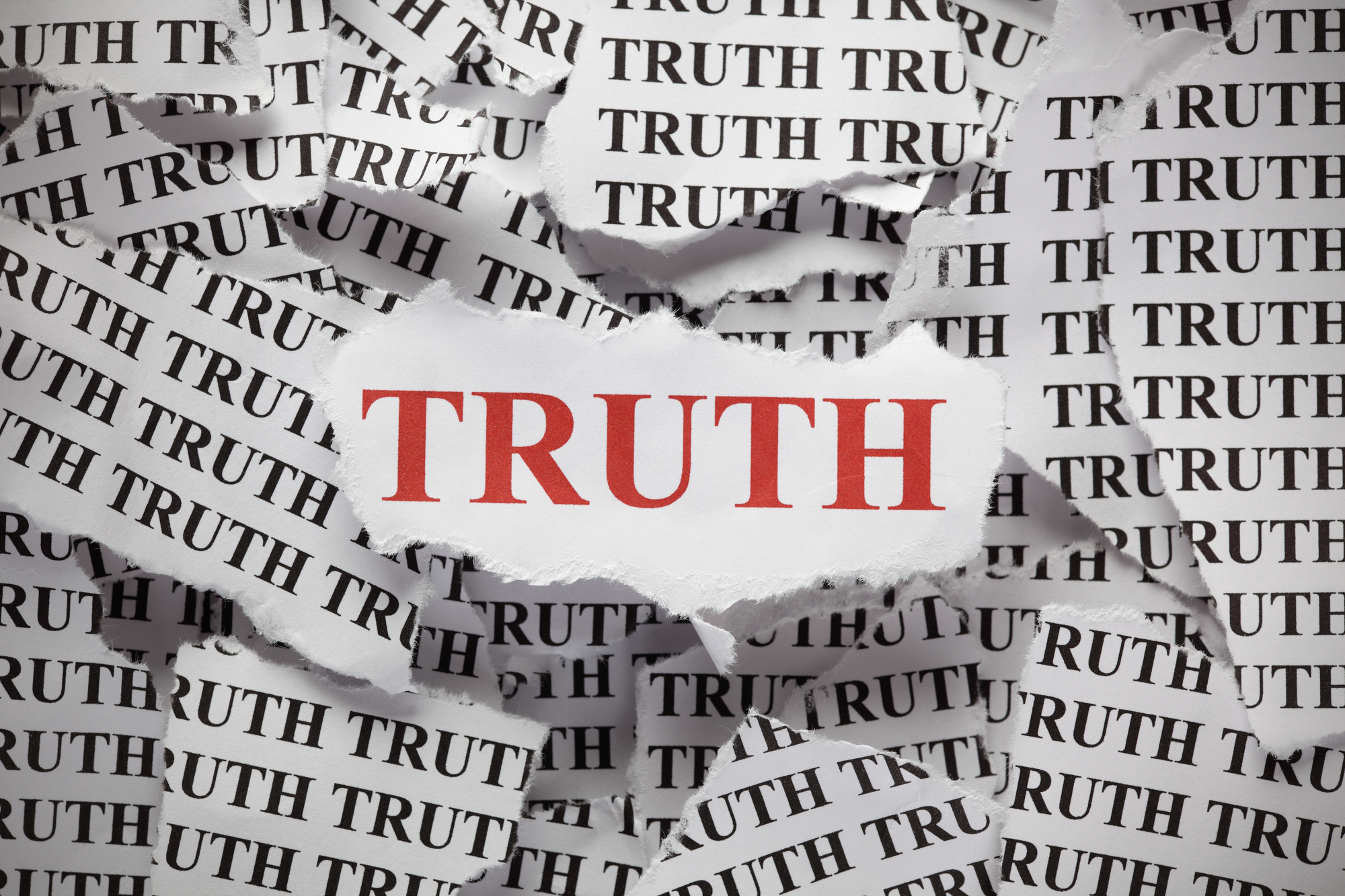The question for today is: What is truth?
Now, this question is huge. Why? Because every other question I address on this blog doesn’t really matter if we don’t have a handle on truth. I mean, think about it. If you don a cape and a large S on your chest and walk to the edge of a cliff, confidently carrying your personal truth that tells you that you can fly, and you boldly leap off the cliff, arms outstretched in the familiar Superman posture. Let me ask you a question. Will your personal truth override the truth? Of course not. In fact, you will certainly usher in early another truth we all must face sooner or later called death.
Truth is the great equalizer. It obliterates contradictory opinion every time. Well, not every time. Sometimes the very laws of nature are defied. In those cases, we have what’s known as a miracle. But since most of us are a little short on those, it would definitely behoove to build our opinions and arguments and persuasions on truth.
Truth is that important. And Jesus considered it foundational as well. He called Himself the truth in John 14:6. He said, in John 8:32, that truth is key to freedom. Who doesn’t want that? As part of the complete armor of God, the apostle Paul talked about this in the book of Ephesians. He called it the belt of truth and said we should fasten this around our waist.
The Truth Hurts
It seems the old saying is true: truth hurts. And this one fact about truth has been its modern-day undoing. In a culture of tolerance and feelings, feelings trump facts. Truth is deemed offensive and often relegated to the back of the line or worse. In fact, let’s take a rather painful but truthful tour down memory lane. Around 2000 years ago, truth was put on trial and judged by people who were devoted to lies. In fact, Jesus (aka Truth) faced six trials in less than a 24-hour period, three of which were religious, and the other three were legal. In the end, few people involved in those trials could answer the question, “What is truth?”
What Truth is NOT
In a postmodern world that denies that truth can be known, the answer to What is the truth is more important than ever. I’ll give you a definition of truth in just a moment. But in defining truth, I think it’s first helpful to know everything the truth isn’t. From the website gotquestions.org, truth is not simply whatever works. This is the philosophy of pragmatism, an “ends versus means” type of approach. In reality, lies can appear to work, but they’re still lies; they’re not the truth.
Other things that ‘truth is not’ includes:
- Truth is not simply what is coherent or understandable. A group of people can get together and form a conspiracy based on a set of falsehoods, where they all agree to tell the same false story, but it does not make their presentation true.
- Truth is not what makes people feel good. Unfortunately, bad news can be true.

Diverse People Holding Hands Truth Concept - Truth is not what the majority says is true. 51%, 80%, 99% of a group can reach a wrong conclusion.
- Truth is not what is comprehensive. A lengthy, detailed presentation can still result in a false conclusion.
- Truth is not defined by what is intended. Good intentions can still be false; they can be wrong.
- Truth is not simply what is believed. Listen, a lie believed is still a lie.
What Truth Is
Truth is not how we know. Truth is what we know. The Greek word for truth is alítheia, which literally means to unhide or hiding nothing. It conveys the thought the truth is always there, always open and available for everybody to see, with nothing being hidden or obscured. The Hebrew word for truth is emet, which means firmness, consistency, and duration. Such a definition implies an everlasting substance and something that can be relied upon.
From a philosophical perspective, there are three simple ways to define truth.
- Truth is that which corresponds to reality.
- Truth is that which matches its object.
- Truth is simply telling it like it is.
Here’s a little more on each of these.
That which corresponds to reality or what is. It’s real. Truth is also correspondent in nature. In other words, it matches its object and is known by its reference.
Truth also matches its object. It may be absolutely true that a certain person may need so many milligrams of a certain medication, but another person may need more or less of the same medication to produce the desired effect. This is not relative truth but just an example of how truth must match its object. It’d be wrong or potentially dangerous for a patient to request that their doctor give them an inappropriate amount of a particular medication. Or to say that any medicine for their specific ailments will do just fine.
The short truth is simply telling it like it is. It is the way things really are, and any other viewpoint is wrong. A foundational-principle philosophy is being able to discern between truth and error, or as Thomas Aquinas observed, it is the task of the philosopher to make distinction.
Challenges to Truth
Now, having said all this, there are still challenges to truth. Aquinas’ words are not very popular today. Making distinctions seems to be out of fashion in a postmodern era of relativism. It’s acceptable today, for instance, to say this is true as long as it’s not followed by and therefore that is false. You find this a lot in matters of faith and religion, where every belief system is supposed to be on equal footing where truth is concerned, but that’s impossible. It’s a complete contradiction. It’s an oxymoron.
There are a number of philosophies and worldviews that challenge the concept of truth. Yet, when each is critically examined, it turns out to be self-defeating in nature.
The popular philosophy taught in universities everywhere today of relativism says that all truth is relative and that there’s no such thing as absolute truth. But then one has to ask, is the claim, “all truth is relative,” a relative truth or an absolute truth? If it is a relative truth, then it really is meaningless. How do we know when and where it applies? If it’s an absolute truth, then absolute truth exists. Moreover, the relativist betrays his own position when he states that the position of the absolutist is wrong. Why can’t those who say absolute truth exists be correct too? In essence, when the relativist says there is no truth, he’s asking you not to believe it. And the best thing you can do is follow his advice.
Those who follow the philosophy of skepticism simply doubt all truth. But is the skeptic skeptical of skepticism? Does he doubt his own truth claim? If so, then why pay attention to skepticism at all?
The agnostic says you can’t know truth, yet that mindset is self-defeating because it claims to know at least one truth…that you can’t know the truth.
Wow, that’s a lot to chew on for now. Come back next time for more as I wrap up this discussion about what is truth.
In the meantime, if you’d like to connect on this and other current issues, check out my twice-weekly video series, “Ask P-RO,” on my YouTube channel. You can dive deeper with me every Tuesday and Friday. Or join us for our Sunday services online or in-person at The Summit.
Until next time, go out and be all out for the truth—Jesus.
~Pastor Rob
Aka, “P-RO”
